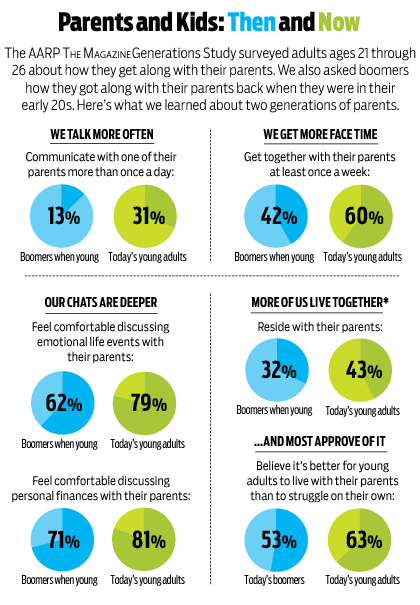Staying Fit
On vacation in Vermont last summer, my son Sam and I would go out on Lake Champlain in the motorboat every morning. We'd hook sunfish and perch, maybe talk Phillies, maybe Phish, maybe philosophy. You know: man stuff.


But when he'd catch a frisky fish, my strapping 23-year-old son would carefully dangle it over to me: Will you take this off the hook for me? Please?


AARP Membership— $12 for your first year when you sign up for Automatic Renewal
Get instant access to members-only products and hundreds of discounts, a free second membership, and a subscription to AARP the Magazine.
If I'd asked my own dad to unhook a fish when I was Sam's age — or even half Sam's age — he would have been dead silent, a clear message to deal with it myself. But these days our kids tend to keep one foot planted in childhood even as they go bounding into their mid-20s with the other. Like many boomers, I'm much closer to Sam and his brother, Nick, 19, than I was to my own parents.
The Generations Study
According to the new AARP The Magazine Generations Study, we boomers talk more frequently with our young-adult children, plus spend more face time and share more intimate confidences with them, than we did with our parents. We also help our kids more, doling out about twice as much advice and practical help as parents did in the mid-1980s. (See below for more about the study's results.)
And we've justified it. Coming of age during economic hard times, many of our kids are struggling to find jobs, to find themselves, to find their way out of their childhood bedrooms. Both of my sons live at home, and I enjoy having this time with them. But I also find the statistics about their generation a bit unnerving. So I wonder: When we keep our kids close, do we keep them from growing up?
At 20, I couldn't wait to leave home. I wanted to be my own man — never mind how I would support myself. During my 20s my mother called me maybe once a month, and my father called me only once. It was to tell me to stop selling my blood; my mother had gotten wind that it was dangerous. (I ignored his advice.) My friends were kindred spirits: We wanted to make our own way, and our own mistakes.
That was the old way of growing up.


































































More on Home and Family
Mother-Daughter Duo Hike Appalachian Trail, Raise $80,000
The pair increased awareness about Parkinson’s disease and learned life lessons